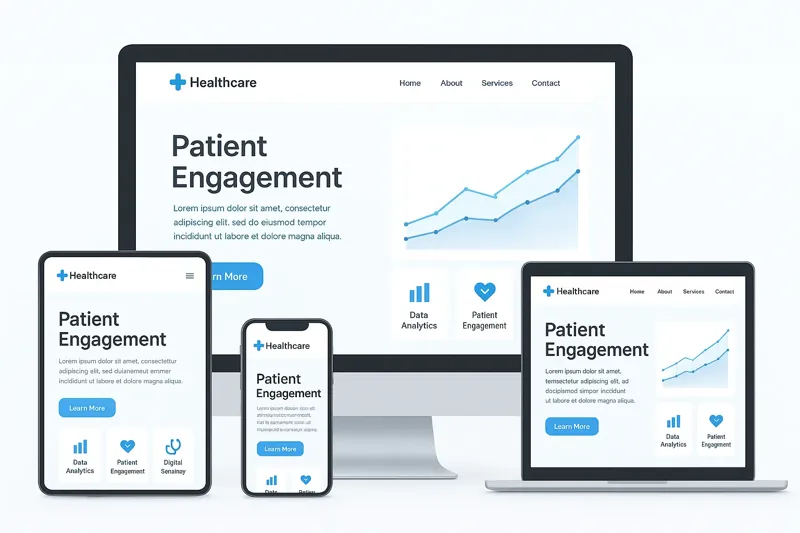The Critical Role of Online Reputation in Patient Trust
The Critical Role of Online Reputation in Patient Trust
In modern healthcare, a provider's online reputation plays a pivotal role in shaping patient trust and influencing healthcare decisions. An overwhelming majority of patients—up to 94%—use online reviews as a primary tool for evaluating healthcare providers before making appointments.
Patients increasingly rely on independent review platforms such as Google Reviews, Healthgrades, and Vitals to assess the quality and reliability of medical professionals. These platforms provide transparent insights into patient experiences, ratings, and satisfaction levels, which are integral to decision-making.
Online reviews significantly impact patient choice. Approximately 77% of patients report that reviews are their initial resource when selecting a new healthcare provider, and 84% would avoid physicians rated below four stars. The presence of numerous positive reviews enhances credibility, whereas unresolved negative feedback can undermine trust.
Healthcare providers who actively monitor, engage with, and respond to online reviews foster greater patient confidence. Thoughtful responses to feedback demonstrate professionalism and commitment to quality care, reinforcing patient loyalty and satisfaction.
Ultimately, a strong and well-managed online reputation not only attracts new patients but also supports long-term retention, helping healthcare organizations thrive in a competitive environment.
Understanding How Online Reviews Impact Patient Trust and Choice

How do online reviews affect patient trust and decision-making?
Online reviews play a crucial role in shaping patient trust and influencing healthcare choices. A significant 94% of patients consult online reviews when evaluating healthcare providers, with 77% considering these reviews as their initial step in seeking a doctor. Positive patient feedback coupled with timely, professional responses from providers fosters greater trust and encourages patient engagement. Conversely, negative reviews can deter potential patients, with many avoiding providers rated below four stars. Thus, managing your online reputation is essential for maintaining patient confidence and supporting healthcare practice growth.
Which platforms are most influential for patient reviews?
Multiple trusted platforms shape patient perceptions, but Google Reviews stands out as the most influential, impacting 83% of patient decisions. Other prominent review sites include Healthgrades, Yelp, Zocdoc, and Facebook, each contributing significantly to patient research and provider evaluations. Patients often use several of these platforms collectively, emphasizing the need for healthcare providers to maintain a strong, consistent presence across multiple review channels.
Effect of review ratings on patient selection
Patients display strong preferences for providers with high star ratings; approximately 84% avoid physicians with ratings below four stars. Typically, patients read between one to six reviews before forming an opinion about a healthcare professional, underscoring the importance of accumulating positive reviews. High ratings not only influence patient trust but also enhance search engine visibility, further attracting new patients. These findings align with best reputation management practices and online reputation management strategies.
Influence of provider responses to reviews
Engagement with online reviews by healthcare providers significantly boosts patient trust. Approximately 59% of patients are more likely to choose a provider who responds thoughtfully to reviews, especially negative ones. Professional and empathetic responses demonstrate accountability and commitment to quality care, which can mitigate the impact of negative feedback and promote a positive patient-provider relationship. Effective responder engagement strategies further enhance trust and improve perception.
| Aspect | Statistic / Fact | Impact |
|---|---|---|
| Patient use of reviews | 94% use reviews to evaluate providers | Critical for trust and decision-making |
| First step for finding a doctor | 77% start with online reviews | Influences provider choice early |
| Top review platform | Google Reviews (83% influence) | Dominates patient research |
| Review impact on selection | 84% avoid <4 star providers | High ratings essential for patient acquisition |
| Provider response value | 59% trust providers more if they respond to reviews | Enhances trust and improves perception |
Strategies for Managing and Enhancing Online Reputation in Healthcare
What tools and strategies help healthcare providers manage their online reputation?
Healthcare providers leverage specialized healthcare reputation management software to efficiently handle patient reviews and feedback. Platforms such as Press Ganey, DocResponse, Chatmeter, and Emitrr stand out by consolidating reviews from various sites like Google, Healthgrades, Yelp, and Facebook into a unified dashboard. This aggregation facilitates real-time monitoring and prompt responses to patient comments, thereby fostering trust and engagement.
Automated review solicitation tools integrated into these systems encourage satisfied patients to leave feedback, addressing the common challenge that patients rarely leave reviews voluntarily. Providers can automate email and SMS requests to maximize review volume, which is crucial since patients often read multiple reviews before choosing a provider.
Sentiment analysis powered by AI helps interpret the emotional tone of patient feedback, enabling healthcare organizations to identify strengths and highlight areas needing improvement. Automated reply generation also speeds up and standardizes professional responses, ensuring timely and respectful engagement even with negative reviews.
Consistency in online listings is another essential strategy. Maintaining accurate, comprehensive, and optimized profiles on key platforms improves local SEO for healthcare, increasing visibility when potential patients search for healthcare services. Ensuring Name, Address, and Phone Number (NAP) accuracy across platforms helps build credibility and avoid confusion.
Together, these tools and strategies create a comprehensive approach to online reputation management that supports patient acquisition and retention, strengthens brand credibility, and serves as a competitive advantage in the healthcare market.
Building Patient Trust Through Transparent and Responsive Online Engagement

How does responding to patient reviews influence trust?
Providers who respond thoughtfully and professionally to both positive and negative reviews build greater patient trust. Nearly 59% of patients are more likely to choose healthcare providers who engage with reviews, recognizing responsiveness as a sign of care and professionalism (patients trust online reviews, importance of online reviews for patients).
Responding professionally to positive and negative reviews
Engaging with positive reviews by expressing gratitude strengthens patient loyalty and encourages more patients to share their positive experiences. When addressing negative feedback, providers should respond promptly, acknowledge concerns sincerely, and offer to resolve issues offline when appropriate. This approach not only limits the potential damage of negative reviews but also demonstrates commitment to quality care (Reputation management for doctors).
Impact of engaging with patient feedback
Active management of online feedback helps healthcare organizations identify areas for improvement, enhance patient satisfaction, and differentiate their brand in a competitive market. Real-time monitoring through reputation management platforms allows for timely, appropriate responses that foster transparent communication, ultimately encouraging patient engagement and retention.
Handling negative feedback to rebuild trust
Professional, empathetic responses to negative reviews can turn patient dissatisfaction into an opportunity for service recovery. Transparency in acknowledging errors and outlining corrective steps helps rebuild confidence. Studies show that thoughtful replies to negative reviews can mitigate their detrimental impact and, in some cases, convert dissatisfied patients into loyal advocates (Service recovery in healthcare).
Importance of transparency and authenticity
Patients value honesty and transparency in their healthcare providers. Maintaining authenticity in online interactions—avoiding generic or defensive responses—and openly addressing patient concerns creates a trustworthy image. Such authenticity in communication reinforces confidence in the quality and integrity of care offered (Transparent communication).
These practices—prompt, genuine responses and transparent communication—are essential components of effective reputation management strategies, directly contributing to patient trust, satisfaction, and organizational growth.
Encouraging Authentic Patient Reviews to Reflect True Care Quality

Why is it challenging to generate patient reviews, and how can providers encourage more?
Many healthcare providers face the challenge that satisfied patients typically provide feedback directly rather than posting online reviews. Meanwhile, dissatisfied patients are disproportionately represented in online review platforms, which can skew a practice's reputation negatively. This imbalance makes it difficult for providers to present a true reflection of care quality.
To counter this, healthcare organizations can motivate satisfied patients to share their experiences by using timely and effective solicitation methods. Sending review requests via email or SMS within 24 hours after appointments is preferred, as patients are more likely to respond promptly. Automating this process through healthcare reputation management software not only streamlines requests but ensures HIPAA compliance.
Furthermore, educating patients about how their candid reviews help improve healthcare services and assist others in making informed decisions fosters goodwill and participation. Providers should also reassure patients that their privacy is strictly protected when submitting reviews.
Balancing volume and quality of reviews is essential; collecting multiple positive reviews creates a comprehensive and trustworthy online presence that can better withstand negative feedback. Encouraging authentic reviews rather than incentivized or fake ones builds long-term credibility, aids in accurate patient perception, and supports sustainable practice growth.
The Impact of Online Reputation on Patient Acquisition, Retention, and Revenue
How Does Online Reputation Influence Patient Loyalty and Acquisition?
A positive online reputation is pivotal in building patient loyalty and attracting new patients. Studies show that patients heavily rely on patients trust online reviews to evaluate healthcare providers, with 84% checking reviews before selecting a provider and 61% prioritizing these over personal referrals. Positive reviews foster Healthcare reputation management trust and brand differentiation, supporting patient retention and converting prospective patients into loyal clients. Healthcare practices that actively manage your online reputation see measurable growth in patient engagement and appointment bookings.
What Financial Impact Does Online Reputation Have on Healthcare Providers?
Online reputation directly affects healthcare revenue. Positive reputations increase patient trust, boost acquisition, and improve retention, contributing to incremental revenue growth. Conversely, negative reviews can cause a significant loss of patients, with the financial ripple effects reaching thousands of dollars in lost revenue due to decreased patient lifetime value. Healthcare organizations often incur additional marketing costs to mitigate poor reputations, underscoring the Financial impact of online healthcare reviews significance of reputation management.
Why Are Online Reviews So Important in Competitive Healthcare Markets?
In highly competitive healthcare markets, online reviews and ratings serve as critical differentiators. Providers with star ratings below four often lose potential patients, as 84% of patients avoid providers with low scores. Reviews impact search engine rankings, enhancing visibility and positioning of providers in local SEO for healthcare — vital for standing out in crowded markets. Active solicitation of positive reviews, professional responses to feedback, and using Reputation management for doctors software optimize these benefits, helping organizations sustain competitive advantage.
Integrating Reputation Management into Patient Growth Strategies
Healthcare organizations leveraging Healthcare reputation management software platforms benefit from Consolidate reviews dashboard, sentiment analysis, and swift feedback response. These tools enable providers to turn patient feedback into actionable insights, strengthening patient relationships and improving service quality. By enhancing transparency and responsiveness, healthcare providers build robust community Building patient trust and patient loyalty, crucial for sustained financial and operational success.
Integrating Patient Experience Insights from Reviews to Improve Care and Trust
How can patient reviews be used to improve healthcare services and patient trust?
Patient reviews serve as a rich source of feedback that healthcare providers can analyze to pinpoint both strengths and areas needing improvement. Utilizing sentiment analysis in healthcare tools enables organizations to decode the emotional tone behind patient comments, helping to better understand patient satisfaction drivers and identify pain points in care delivery.
By sharing insights from reviews with clinicians and staff, healthcare organizations can target communication skills training and service quality enhancements. This patient-centered nursing approach fosters empathy, responsiveness, and transparency, which are essential for building trust.
Moreover, actively managing your online reputation and aligning the healthcare provider’s online reputation with the actual quality of care delivered reinforces credibility and patient loyalty. Consistency between what patients experience and what they read online reduces skepticism and encourages engagement.
In sum, leveraging patient feedback through healthcare reputation management review analysis and sentiment monitoring creates a feedback loop that promotes continuous quality improvement and strengthens patient-provider relationships.
The Interplay Between Nurse-Patient Relationships and Online Reputation
Importance of Trust in Nurse-Patient Interactions
Trust serves as the cornerstone of the nurse-patient relationship. It fosters compassionate care and encourages open communication, facilitating shared decision-making. Patients who trust their nurses feel safe and supported, which enhances their overall healthcare experience.
How Trust Improves Patient Satisfaction and Outcomes
When patients have confidence in their nurses, they tend to be more satisfied with their care and show better compliance with treatment plans. Trust helps patients disclose sensitive information, allowing for more effective and personalized treatment, which often results in improved health outcomes and shorter treatment durations.
Role of Communication and Empathy in Trust
Active listening, patience, and empathy are critical behaviors that nurses must exhibit to earn and maintain patient trust. Showing understanding and validating patients’ emotions empowers patients and builds rapport, which is essential for fostering trustful relationships.
Relation to Reputation Management
Strong nurse-patient trust translates into positive patient experiences, which patients are likely to share in reviews and feedback. These positive interactions influence a healthcare provider’s online reputation by increasing favorable reviews and patient loyalty. Consequently, fostering trust within clinical teams can become a strategic component of online reputation management, enhancing patient acquisition and retention.
How do nurse-patient trust relationships contribute to online reputation and patient trust?
Trust in nurse-patient relations is foundational to fostering effective communication and emotional support, leading to better health outcomes. These improved experiences positively influence patient satisfaction and reviews, thereby bolstering the healthcare provider's online reputation and overall patient trust.
Leveraging Digital Marketing to Support Reputation and Foster Patient Trust

How does digital marketing tie into online reputation management to build patient trust?
Digital marketing in healthcare strategically combines personalized communication channels such as email, SMS, and social media with reputation management efforts to enhance patient trust and loyalty. These patient-centered digital communication strategies enable providers to engage patients before, during, and after care, addressing their needs while promoting transparency and responsiveness.
Patient-centered digital communication strategies
Healthcare organizations use tailored messaging delivered via email and SMS to keep patients informed about appointments, health guidance, and feedback opportunities. Social media platforms serve as an additional channel for sharing educational content and responding to patient concerns publicly and promptly, reinforcing a transparent and caring image. These strategies are part of healthcare digital marketing strategies.
HIPAA-compliant digital marketing tools
Leveraging HIPAA-compliant platforms ensures that patient data used in these communications remains secure and confidential. Employing compliant marketing tools not only fulfills regulatory requirements but also strengthens patient confidence in how their information is handled.
Personalized patient engagement via email, SMS, social media
Personalization technologies enable targeted outreach based on patient preferences, behaviors, and health conditions, making communications relevant and meaningful. Automated yet sensitive interactions, such as review solicitations following visits, encourage genuine patient feedback that can enhance online reputation.
Measuring ROI of digital reputation management efforts
Digital marketing combined with reputation management provides measurable outcomes through metrics like patient engagement rates, online review volume and sentiment, patient acquisition, and retention statistics. Tracking these indicators helps healthcare providers optimize communication strategies to maximize trust-building and growth as described in healthcare online reputation management.
By integrating digital marketing with robust reputation management practices, healthcare organizations create a cohesive approach that supports transparent, secure, and personalized patient experiences, ultimately fostering stronger trust and sustainable growth.
Sustaining Trust Through Continuous Reputation Management Efforts
The Importance of Ongoing Monitoring and Engagement
Continuous monitoring of patient feedback across platforms such as Google, Healthgrades, and Yelp is essential for maintaining a trustworthy healthcare brand. Real-time reputation management tools consolidate reviews onto a single dashboard, enabling swift responses to patient concerns. Prompt replies—especially to negative feedback—demonstrate commitment to patient care and reinforce transparency.
Building and Preserving Patient Trust
Trust is the foundation of the patient-provider relationship and must be actively cultivated. Engaging thoughtfully with patient reviews—both positive and negative—shows empathy and accountability. Providers should uphold consistent, HIPAA-compliant communication that respects patient privacy. Transparency in handling feedback fosters confidence, encourages more balanced reviews, and supports better health outcomes.
Vision for Long-Term Growth Through Reputation Excellence
Sustained reputation excellence creates a competitive advantage by driving patient acquisition and retention. By leveraging sentiment analysis and benchmarking, healthcare organizations can identify service gaps and amplify positive experiences. A proactive culture that values continuous improvement, authentic patient engagement, and data-driven strategies positions organizations for scalable growth and enduring community trust.
The Critical Role of Online Reputation in Patient Trust
The Critical Role of Online Reputation in Patient Trust
In modern healthcare, a provider's online reputation plays a pivotal role in shaping patient trust and influencing healthcare decisions. An overwhelming majority of patients—up to 94%—use online reviews as a primary tool for evaluating healthcare providers before making appointments.
Patients increasingly rely on independent review platforms such as Google Reviews, Healthgrades, and Vitals to assess the quality and reliability of medical professionals. These platforms provide transparent insights into patient experiences, ratings, and satisfaction levels, which are integral to decision-making.
Online reviews significantly impact patient choice. Approximately 77% of patients report that reviews are their initial resource when selecting a new healthcare provider, and 84% would avoid physicians rated below four stars. The presence of numerous positive reviews enhances credibility, whereas unresolved negative feedback can undermine trust.
Healthcare providers who actively monitor, engage with, and respond to online reviews foster greater patient confidence. Thoughtful responses to feedback demonstrate professionalism and commitment to quality care, reinforcing patient loyalty and satisfaction.
Ultimately, a strong and well-managed online reputation not only attracts new patients but also supports long-term retention, helping healthcare organizations thrive in a competitive environment.
Understanding How Online Reviews Impact Patient Trust and Choice

How do online reviews affect patient trust and decision-making?
Online reviews play a crucial role in shaping patient trust and influencing healthcare choices. A significant 94% of patients consult online reviews when evaluating healthcare providers, with 77% considering these reviews as their initial step in seeking a doctor. Positive patient feedback coupled with timely, professional responses from providers fosters greater trust and encourages patient engagement. Conversely, negative reviews can deter potential patients, with many avoiding providers rated below four stars. Thus, managing your online reputation is essential for maintaining patient confidence and supporting healthcare practice growth.
Which platforms are most influential for patient reviews?
Multiple trusted platforms shape patient perceptions, but Google Reviews stands out as the most influential, impacting 83% of patient decisions. Other prominent review sites include Healthgrades, Yelp, Zocdoc, and Facebook, each contributing significantly to patient research and provider evaluations. Patients often use several of these platforms collectively, emphasizing the need for healthcare providers to maintain a strong, consistent presence across multiple review channels.
Effect of review ratings on patient selection
Patients display strong preferences for providers with high star ratings; approximately 84% avoid physicians with ratings below four stars. Typically, patients read between one to six reviews before forming an opinion about a healthcare professional, underscoring the importance of accumulating positive reviews. High ratings not only influence patient trust but also enhance search engine visibility, further attracting new patients. These findings align with best reputation management practices and online reputation management strategies.
Influence of provider responses to reviews
Engagement with online reviews by healthcare providers significantly boosts patient trust. Approximately 59% of patients are more likely to choose a provider who responds thoughtfully to reviews, especially negative ones. Professional and empathetic responses demonstrate accountability and commitment to quality care, which can mitigate the impact of negative feedback and promote a positive patient-provider relationship. Effective responder engagement strategies further enhance trust and improve perception.
| Aspect | Statistic / Fact | Impact |
|---|---|---|
| Patient use of reviews | 94% use reviews to evaluate providers | Critical for trust and decision-making |
| First step for finding a doctor | 77% start with online reviews | Influences provider choice early |
| Top review platform | Google Reviews (83% influence) | Dominates patient research |
| Review impact on selection | 84% avoid <4 star providers | High ratings essential for patient acquisition |
| Provider response value | 59% trust providers more if they respond to reviews | Enhances trust and improves perception |
Strategies for Managing and Enhancing Online Reputation in Healthcare
What tools and strategies help healthcare providers manage their online reputation?
Healthcare providers leverage specialized healthcare reputation management software to efficiently handle patient reviews and feedback. Platforms such as Press Ganey, DocResponse, Chatmeter, and Emitrr stand out by consolidating reviews from various sites like Google, Healthgrades, Yelp, and Facebook into a unified dashboard. This aggregation facilitates real-time monitoring and prompt responses to patient comments, thereby fostering trust and engagement.
Automated review solicitation tools integrated into these systems encourage satisfied patients to leave feedback, addressing the common challenge that patients rarely leave reviews voluntarily. Providers can automate email and SMS requests to maximize review volume, which is crucial since patients often read multiple reviews before choosing a provider.
Sentiment analysis powered by AI helps interpret the emotional tone of patient feedback, enabling healthcare organizations to identify strengths and highlight areas needing improvement. Automated reply generation also speeds up and standardizes professional responses, ensuring timely and respectful engagement even with negative reviews.
Consistency in online listings is another essential strategy. Maintaining accurate, comprehensive, and optimized profiles on key platforms improves local SEO for healthcare, increasing visibility when potential patients search for healthcare services. Ensuring Name, Address, and Phone Number (NAP) accuracy across platforms helps build credibility and avoid confusion.
Together, these tools and strategies create a comprehensive approach to online reputation management that supports patient acquisition and retention, strengthens brand credibility, and serves as a competitive advantage in the healthcare market.
Building Patient Trust Through Transparent and Responsive Online Engagement

How does responding to patient reviews influence trust?
Providers who respond thoughtfully and professionally to both positive and negative reviews build greater patient trust. Nearly 59% of patients are more likely to choose healthcare providers who engage with reviews, recognizing responsiveness as a sign of care and professionalism (patients trust online reviews, importance of online reviews for patients).
Responding professionally to positive and negative reviews
Engaging with positive reviews by expressing gratitude strengthens patient loyalty and encourages more patients to share their positive experiences. When addressing negative feedback, providers should respond promptly, acknowledge concerns sincerely, and offer to resolve issues offline when appropriate. This approach not only limits the potential damage of negative reviews but also demonstrates commitment to quality care (Reputation management for doctors).
Impact of engaging with patient feedback
Active management of online feedback helps healthcare organizations identify areas for improvement, enhance patient satisfaction, and differentiate their brand in a competitive market. Real-time monitoring through reputation management platforms allows for timely, appropriate responses that foster transparent communication, ultimately encouraging patient engagement and retention.
Handling negative feedback to rebuild trust
Professional, empathetic responses to negative reviews can turn patient dissatisfaction into an opportunity for service recovery. Transparency in acknowledging errors and outlining corrective steps helps rebuild confidence. Studies show that thoughtful replies to negative reviews can mitigate their detrimental impact and, in some cases, convert dissatisfied patients into loyal advocates (Service recovery in healthcare).
Importance of transparency and authenticity
Patients value honesty and transparency in their healthcare providers. Maintaining authenticity in online interactions—avoiding generic or defensive responses—and openly addressing patient concerns creates a trustworthy image. Such authenticity in communication reinforces confidence in the quality and integrity of care offered (Transparent communication).
These practices—prompt, genuine responses and transparent communication—are essential components of effective reputation management strategies, directly contributing to patient trust, satisfaction, and organizational growth.
Encouraging Authentic Patient Reviews to Reflect True Care Quality

Why is it challenging to generate patient reviews, and how can providers encourage more?
Many healthcare providers face the challenge that satisfied patients typically provide feedback directly rather than posting online reviews. Meanwhile, dissatisfied patients are disproportionately represented in online review platforms, which can skew a practice's reputation negatively. This imbalance makes it difficult for providers to present a true reflection of care quality.
To counter this, healthcare organizations can motivate satisfied patients to share their experiences by using timely and effective solicitation methods. Sending review requests via email or SMS within 24 hours after appointments is preferred, as patients are more likely to respond promptly. Automating this process through healthcare reputation management software not only streamlines requests but ensures HIPAA compliance.
Furthermore, educating patients about how their candid reviews help improve healthcare services and assist others in making informed decisions fosters goodwill and participation. Providers should also reassure patients that their privacy is strictly protected when submitting reviews.
Balancing volume and quality of reviews is essential; collecting multiple positive reviews creates a comprehensive and trustworthy online presence that can better withstand negative feedback. Encouraging authentic reviews rather than incentivized or fake ones builds long-term credibility, aids in accurate patient perception, and supports sustainable practice growth.
The Impact of Online Reputation on Patient Acquisition, Retention, and Revenue
How Does Online Reputation Influence Patient Loyalty and Acquisition?
A positive online reputation is pivotal in building patient loyalty and attracting new patients. Studies show that patients heavily rely on patients trust online reviews to evaluate healthcare providers, with 84% checking reviews before selecting a provider and 61% prioritizing these over personal referrals. Positive reviews foster Healthcare reputation management trust and brand differentiation, supporting patient retention and converting prospective patients into loyal clients. Healthcare practices that actively manage your online reputation see measurable growth in patient engagement and appointment bookings.
What Financial Impact Does Online Reputation Have on Healthcare Providers?
Online reputation directly affects healthcare revenue. Positive reputations increase patient trust, boost acquisition, and improve retention, contributing to incremental revenue growth. Conversely, negative reviews can cause a significant loss of patients, with the financial ripple effects reaching thousands of dollars in lost revenue due to decreased patient lifetime value. Healthcare organizations often incur additional marketing costs to mitigate poor reputations, underscoring the Financial impact of online healthcare reviews significance of reputation management.
Why Are Online Reviews So Important in Competitive Healthcare Markets?
In highly competitive healthcare markets, online reviews and ratings serve as critical differentiators. Providers with star ratings below four often lose potential patients, as 84% of patients avoid providers with low scores. Reviews impact search engine rankings, enhancing visibility and positioning of providers in local SEO for healthcare — vital for standing out in crowded markets. Active solicitation of positive reviews, professional responses to feedback, and using Reputation management for doctors software optimize these benefits, helping organizations sustain competitive advantage.
Integrating Reputation Management into Patient Growth Strategies
Healthcare organizations leveraging Healthcare reputation management software platforms benefit from Consolidate reviews dashboard, sentiment analysis, and swift feedback response. These tools enable providers to turn patient feedback into actionable insights, strengthening patient relationships and improving service quality. By enhancing transparency and responsiveness, healthcare providers build robust community Building patient trust and patient loyalty, crucial for sustained financial and operational success.
Integrating Patient Experience Insights from Reviews to Improve Care and Trust
How can patient reviews be used to improve healthcare services and patient trust?
Patient reviews serve as a rich source of feedback that healthcare providers can analyze to pinpoint both strengths and areas needing improvement. Utilizing sentiment analysis in healthcare tools enables organizations to decode the emotional tone behind patient comments, helping to better understand patient satisfaction drivers and identify pain points in care delivery.
By sharing insights from reviews with clinicians and staff, healthcare organizations can target communication skills training and service quality enhancements. This patient-centered nursing approach fosters empathy, responsiveness, and transparency, which are essential for building trust.
Moreover, actively managing your online reputation and aligning the healthcare provider’s online reputation with the actual quality of care delivered reinforces credibility and patient loyalty. Consistency between what patients experience and what they read online reduces skepticism and encourages engagement.
In sum, leveraging patient feedback through healthcare reputation management review analysis and sentiment monitoring creates a feedback loop that promotes continuous quality improvement and strengthens patient-provider relationships.
The Interplay Between Nurse-Patient Relationships and Online Reputation
Importance of Trust in Nurse-Patient Interactions
Trust serves as the cornerstone of the nurse-patient relationship. It fosters compassionate care and encourages open communication, facilitating shared decision-making. Patients who trust their nurses feel safe and supported, which enhances their overall healthcare experience.
How Trust Improves Patient Satisfaction and Outcomes
When patients have confidence in their nurses, they tend to be more satisfied with their care and show better compliance with treatment plans. Trust helps patients disclose sensitive information, allowing for more effective and personalized treatment, which often results in improved health outcomes and shorter treatment durations.
Role of Communication and Empathy in Trust
Active listening, patience, and empathy are critical behaviors that nurses must exhibit to earn and maintain patient trust. Showing understanding and validating patients’ emotions empowers patients and builds rapport, which is essential for fostering trustful relationships.
Relation to Reputation Management
Strong nurse-patient trust translates into positive patient experiences, which patients are likely to share in reviews and feedback. These positive interactions influence a healthcare provider’s online reputation by increasing favorable reviews and patient loyalty. Consequently, fostering trust within clinical teams can become a strategic component of online reputation management, enhancing patient acquisition and retention.
How do nurse-patient trust relationships contribute to online reputation and patient trust?
Trust in nurse-patient relations is foundational to fostering effective communication and emotional support, leading to better health outcomes. These improved experiences positively influence patient satisfaction and reviews, thereby bolstering the healthcare provider's online reputation and overall patient trust.
Leveraging Digital Marketing to Support Reputation and Foster Patient Trust

How does digital marketing tie into online reputation management to build patient trust?
Digital marketing in healthcare strategically combines personalized communication channels such as email, SMS, and social media with reputation management efforts to enhance patient trust and loyalty. These patient-centered digital communication strategies enable providers to engage patients before, during, and after care, addressing their needs while promoting transparency and responsiveness.
Patient-centered digital communication strategies
Healthcare organizations use tailored messaging delivered via email and SMS to keep patients informed about appointments, health guidance, and feedback opportunities. Social media platforms serve as an additional channel for sharing educational content and responding to patient concerns publicly and promptly, reinforcing a transparent and caring image. These strategies are part of healthcare digital marketing strategies.
HIPAA-compliant digital marketing tools
Leveraging HIPAA-compliant platforms ensures that patient data used in these communications remains secure and confidential. Employing compliant marketing tools not only fulfills regulatory requirements but also strengthens patient confidence in how their information is handled.
Personalized patient engagement via email, SMS, social media
Personalization technologies enable targeted outreach based on patient preferences, behaviors, and health conditions, making communications relevant and meaningful. Automated yet sensitive interactions, such as review solicitations following visits, encourage genuine patient feedback that can enhance online reputation.
Measuring ROI of digital reputation management efforts
Digital marketing combined with reputation management provides measurable outcomes through metrics like patient engagement rates, online review volume and sentiment, patient acquisition, and retention statistics. Tracking these indicators helps healthcare providers optimize communication strategies to maximize trust-building and growth as described in healthcare online reputation management.
By integrating digital marketing with robust reputation management practices, healthcare organizations create a cohesive approach that supports transparent, secure, and personalized patient experiences, ultimately fostering stronger trust and sustainable growth.
Sustaining Trust Through Continuous Reputation Management Efforts
The Importance of Ongoing Monitoring and Engagement
Continuous monitoring of patient feedback across platforms such as Google, Healthgrades, and Yelp is essential for maintaining a trustworthy healthcare brand. Real-time reputation management tools consolidate reviews onto a single dashboard, enabling swift responses to patient concerns. Prompt replies—especially to negative feedback—demonstrate commitment to patient care and reinforce transparency.
Building and Preserving Patient Trust
Trust is the foundation of the patient-provider relationship and must be actively cultivated. Engaging thoughtfully with patient reviews—both positive and negative—shows empathy and accountability. Providers should uphold consistent, HIPAA-compliant communication that respects patient privacy. Transparency in handling feedback fosters confidence, encourages more balanced reviews, and supports better health outcomes.
Vision for Long-Term Growth Through Reputation Excellence
Sustained reputation excellence creates a competitive advantage by driving patient acquisition and retention. By leveraging sentiment analysis and benchmarking, healthcare organizations can identify service gaps and amplify positive experiences. A proactive culture that values continuous improvement, authentic patient engagement, and data-driven strategies positions organizations for scalable growth and enduring community trust.






